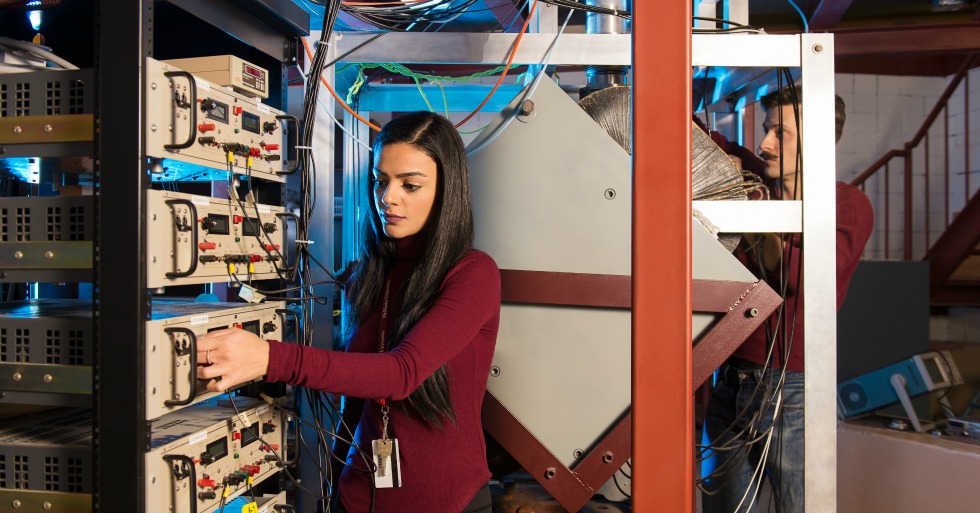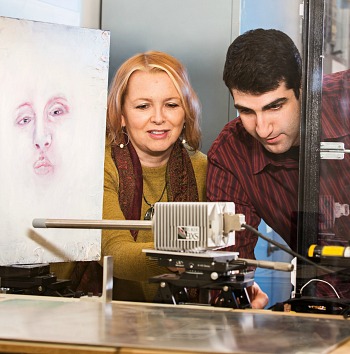McMaster’s unique-in-Canada Radiation Sciences Grad program has much to offer future students

Graduate students Nourhan Shalaby (left) and Thomas Ulrich, both in McMaster’s newly re-launched Radiation Sciences Graduate (Rad Grad) Program, work in the Accelerator Laboratory. This accelerator allows researchers to study the biological effects of single charged particles on human and animal cells.
BY Erica Balch
February 23, 2017
Working with NASA to build a satellite that studies radiation in space. Developing medical devices to help surgeons tell the difference between normal and cancerous tissue. Studying the effects of low and high doses of radiation on human health and ecosystems.
This is just some of the innovative research currently being undertaken by students and supervisors in McMaster’s recently re-launched Interdisciplinary Radiation Sciences Graduate (Rad Grad) Program.
“If it involves radiation, we research it here at McMaster,” says Fiona McNeill, Director of the Rad Grad program. “We offer some of the best education in the world is this area and provide students with a range of opportunities to be involved in cutting-edge, interdisciplinary research both with our world-class researchers here at McMaster and with industry.”
Rad Grad offers three steams of programming including; Radiation Biology, which focuses on the effects of radiation on people and animals; Medical Physics, offering preparation for careers related to health care such as medical imaging or radiation therapy; and Health Physics, which provides radiation protection education and prepares students to work in the nuclear industry.

The Rad Grad program is now accepting applications for next year. McNeill sat down recently with the Daily News to expand on what McMaster’s Rad Grad program has to offer future students:
Why is McMaster’s Rad Grad program different from programs related to radiation science offered elsewhere?
There are a number of medical physics programs across Canada, but they are very much aimed at an end point in health care. With our program, there are number of streams – students can do health-related medical physics, but they can also do health physics and radiation biology. That mix of disciplines is very unique.
What’s unique about McMaster as a place to study radiation sciences?
Really what has pulled this all together and made this possible is the infrastructure. We are Canada’s nuclear university. We have a fantastic array of equipment. We have a reactor; we have three linear accelerators; we have a cyclotron, and many different labs.
This infrastructure has attracted a lot of people here to do different kinds of radiation work. This has helped to create a truly interdisciplinary environment, which provides great opportunities for research and for learning. There’s no other graduate program where if you’re teaching a class you can say, ‘Well let’s go look at that in the reactor!’ It’s a really fabulous thing to have access to that kind of hands-on research and education.
You say the Rad Grad program is highly interdisciplinary, what difference does that make for students?
We have supervisors from many disciplines who are all looking at different aspects of radiation science. We collaborate with engineers, physicists, biologists, physicians – we’re interested in collaborating with people in other disciplines as well.
There are some questions that can only be answered by this kind of cross-disciplinary work. Faculty members in the program really love working in an interdisciplinary environment and they’re doing research that no one else in the world is doing – this kind of interdisciplinary collaboration opens up many more avenues of research for students.
What kinds of research opportunities are there for grad students?
Because we have a broad range of supervisors from many different backgrounds, we have a huge range of programs that students could work on.
For example, Ontario is going through this massive refurbishment of nuclear power stations. Stations will be cut apart and equipment will be replaced so it’s an unusual situation where there is potential to have radiation around. Ontario Power Generation (OPG) and Bruce Power have asked one of our researchers, Soo Hyun Byun to design new types of radiation detectors to monitor those radiation fields. His students that will be able to do some really interesting things like help design these detectors and test them at Darlington, Pickering and Bruce Nuclear Power Stations.
What kinds of opportunities are there for Rad Grad students to work with industry?
We have a number of supervisors and students working with Ontario Power Generation, Bruce Power, the Juravinski Cancer Centre and many others – in fact, those relationships that have been so successful for us that we’d like to create more of them and are always looking for opportunities to work with new industry partners.
Students learn a range of skills they don’t get in the university environment alone. They get to work in real-life situations with industry researchers. They start to network and create relationships with people that can mentor them and advise them. It helps them to become highly employable and to move more smoothly into employment.
Anything to add?
We’re very proud of this program. Students have access to some truly unique facilities and the opportunity to work with some of the top researchers in their fields, as well as experts from industry, plus, they’ll be highly employable when they graduate.
Watch videos highlighting the radiation-related research currently underway by students and supervisors in the Program:
Follow the Program’s social media accounts for regular updates:


